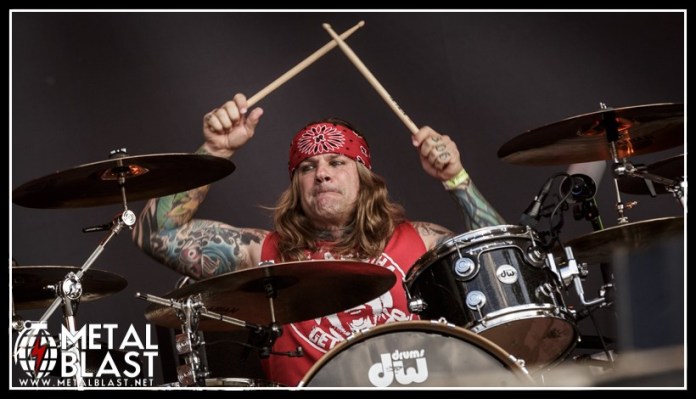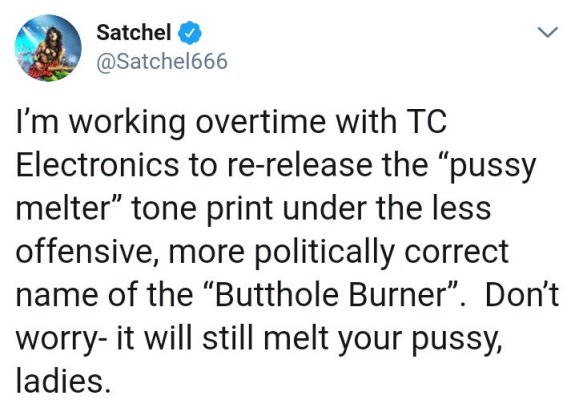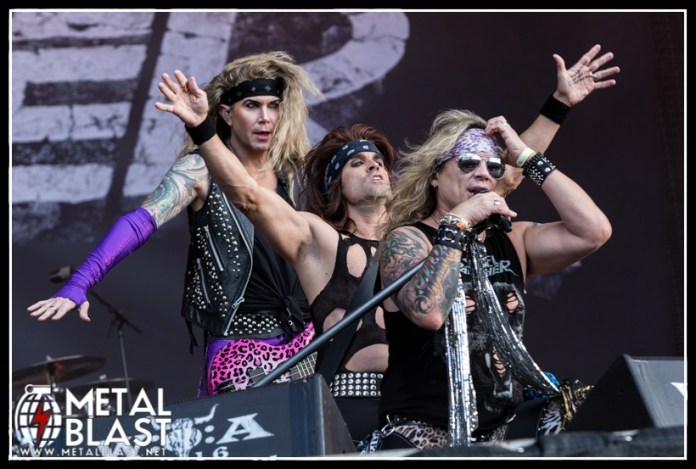
Glam Metal 101
I wanted to be like Van Halen
Steel Panther occupies and interest place in the Pantheon of contemporary artists. Unlike most comedy acts (such as The Flight of the Conchords, Garfunkel and Oates, or Weird Al Yankovic) their musical output stands on its own merits, separate from the comedy lyrical content. At same time, unlike the vast majority of heavy metal bands, all of their lyrics are tongue-in-cheek, written as ridiculous and over-top tales of absolute debauchery and excess, coupled with a healthy dose of self-deprecation. It is perhaps this combination that has allowed Steel Panther to be a successful glam metal band at a time when the genre does not ignite a lot of mainstream interest. And yet, for Michael Starr, the singer of Steel Panther, love for glam metal and the music icons of the 80’s has been with him almost his entire life.
“I have an older brother who’s 6 years older than me. He turned me on to stuff like like Deep Purple, early Scorpions, Black Sabbath, Kiss, etc. When I was around 13 or 14 I had Led Zeppelin posters all over my wall, but when Van Halen came out I really got into them. I took down my Led Zeppelin posters and put up posters of David Lee Roth and Eddie Van Halen. They turned out to be my favorite band, and what I really liked. That was the beginning for me.
When the new wave of metal came out, with bands like the Mötley Crüe, Ratt, and Bon Jovi, it seemed to me like everyone was just copying Van Halen! They were really the biggest thing for me in the beginning of the 80’s. I wanted to be like Van Halen.”
It is hard to overstate how influential David Lee Roth and Van Halen were for Michael Starr. As the singer of Atomic Punks in the 90s and early 2000s’, Michael (whose real name is Ralph Saenz, but performed back then as “David Lee Ralph”) developed his technique emulating the legendary singer.
Still, it would be unfairly reductionist to see Steel Panther as just a band trying to do what Van Halen have already done. Indeed, while Van Halen were, by and large, a straightforward metal band, Steel Panther have added their own comedy twist to it, and they’ve done quite well by taking that approach.
A few years ago, when I briefly met Michael at Wacken Open Air (where he also was quick to point out that he had no idea why Wikipedia wrongfully lists him as having a PhD in English from UC Berkeley) I learned that he doesn’t particularly enjoy comparisons with Spinal Tap. He doesn’t want people to think of Steel Panther as “just” a comedy act, ignoring the actual heavy metal songwriting skills that come into play to create their music.
“Spinal Tap wasn’t a thought for me when we were starting Steel Panther. We weren’t trying to do what they did. I mean, what they talked about is funny, and some of it was actually true for us, but we never set ourselves to be like a ‘funny’ band; we do it like this because we like it like this. Satchel and I got together early in our careers, and when we’d get on stage and start jamming together, we would crack jokes at each other because that’s just what we normally do as human beings. Right when we started doing all that stuff, and just being ourselves and not try to conform to what radio or record labels wanted, that’s when we were able to get signed. It connected to people”.
Of course, there are many bands that joke around on stage, and not all of them end up making comedy a central part of their careers. Opeth‘s Mikael Akerfeldt and Katatonia’s Jonas Renkse often joke in between songs, but their lyrical content still maintains a certain doom and gloom to it; something similar can be said of Iron Maiden‘s Bruce Dickinson and Metallica’s James Hetfield, whose occasional banters have not affected the more serious-tone of the music. Steel Panther are different, because they’ve gone all in when it comes to comedy, connecting every aspect of their music and their shows with humor, exaggerating their own personalities in the creation of their respective “characters” (although Michael isn’t really happy with that term).
“I mean, we have characters, but I’m dressed the way I want to dress. This is not because I want to ‘create a character’, but because I like to wear that stuff! Back when Nirvana came out and killed heavy metal, I was like ‘fuck that I love heavy metal!’. Then it wasn’t cool to wear spandex, to do your hair like this, to wear bandanas… all of that was over for the record labels, radio and MTV, but that’s what I really, really liked, and that’s what we all really liked. All of our peers were cutting their hair and copying Pearl Jam and Soundgarden, but I was like ‘Fuck that!’. I still like Van Halen and Mötley Crüe, and this is what I like to do! What you’re seeing in the band is really organic.
What you see in Steel Panther is a true extension of who we really are as people. I mean, I know that people get a laugh out of our songs, because of the lyrical content and the way in which the stories are drawn out in a humorous way, but they’re really just true biographies of our life, of what we’ve done in the past, and of stuff that’s happened to us when we started touring as a band. As we put out more records we pretty much just started talking about shit that’s really happening for us. Satchel, our guitar player, is the main writer of the songs, and he’ll just take an idea from humorous stuff that we’ve said in conversation on tour or when we’re traveling, and which is really true, and use that in a song.”

“We get outlandish, silly and unbelievable but, at the same time, it’s real. When we play in festivals a lot of bands will come out to see us play, and I think that’s because the shit we’re talking about is stuff that is happening to them, but they don’t talk about it in their music. In our case, we’ve found a way to express ourselves in a way that is not necessarily acceptable… but we just don’t give a fuck.
Lexxi, for example, really is like that when he’s not on stage! When he gets off stage he takes off his stage makeup and just puts on a different makeup for daily use. That’s just how he is when he’s getting ready for the show; he’s always in front of the mirror… like all the time. Some backstage areas only have one mirror, and it’s usually in the bathroom; I normally wait until about 20 minutes before the show to get dressed, and he’s still in the mirror! And he started an hour and a half ago talking with himself, cutting his hair, retouching his makeup at all that shit! That’s who he really is as a person!
[As for the jokes about being old and fat] When I was like 9 or 10 I gained a bunch of weight and I got fat. It’s always been a thing in my head that even if I’m skinny I feel like I’m fat. So Satchel will say that shit on stage just to really fuck with me! Him and I, we’d use to really go at it for real. I’d be like ‘shut the fuck up!’, and we’d fight on stage for real. Now, after all these years together, we’ve learned how each of our personalities work and how to navigate them. In the beginning I’d try to be shirtless on stage and he’d be like ‘YOU’RE TOO FAT NOT TO WEAR A SHIRT! LOOK AT YOUR CELLULITE!’ and all that kind of shit, so I’d just start talking about how his dick is really small” [laughs]

In addition to the jokes that they make at each other’s expense, the lyrics of Steel Panther songs are made in jest. With songs like “Community Property” (“My heart belongs to you / But my cock is community property”), “Death To All But Metal” (“50 Cent’s a fag, so is Kanye West / Shooting hot sperm on each others’ chest”) and “Gloryhole” (“Honey, I don’t wanna know / Who’s sucking my dick today”) it’s obvious that they don’t want their lyrics to be taken too seriously. As Satchel himself said in an interview, “Let’s face it, we don’t take anything very seriously, and that’s a good way to live. If you take yourself too seriously you’re going to be fucking miserable.” Michael seems to agree
“We tried to get signed. We did a showcase at the Whisky for some record labels; we played ‘Death to All but Metal’, ‘Hell’s on Fire’, and other songs that we haven’t released. I remember a label guy came up to me after the show and told me that we were great, but that everything was moving towards grunge, that we were heavy metal, and that heavy metal was over. He also said ‘your songs aren’t that great’. I didn’t agree with that!
At that point we were trying to conform to what the labels wanted so that we could get signed, because we felt that would be the best thing for us; but then, after that, we saw what was happening with the music industry and how bands weren’t making money off their music anymore. People were downloading illegally, MTV was pretty much dead…. so we thought that we should just do what we wanted do, just do the stuff that makes us happy. That was to just have fun and be funny. We were doing that in between songs already, but we thought that we should just write about what we wanna write about, and that’s that’s how we became who we are. Once we did that, we got signed, which is ironic!
How Much is Too Much?
Steel Panther‘s music and lyrics are certainly not for everyone. People who are unfamiliar with the band and who are exposed to their music or their antics sometimes think that everything is serious. When TC Electronics announced their Pussy Melter pedal (a collaboration with Satchel), there was significant backlash from people who saw it as extremely demeaning and offensive to women (gear store Reverb.com went as far as to say that it promoted violence to women). The band joked about the controversy, with Satchel fueling the flames in some now-deleted tweets, mocking the idea of people being offended by this.

A petition by a couple of female musicians demanding the withdrawal of the product gathered some support (about 1,000 signatures) as well as some media backlash against the company. TC Electronics, which had advertised the pedal by saying that Satchel‘s only condition had been that “the tone be as wet as the ladies on the front row,” has since removed the pedal from their store, and renamed it “Repeat Offender” (how that is supposed to be better than “Pussy Melter” has yet to be explained). Despite making some jokes at the expense of TC Electronics (saying that they should rename the company “PC Electronics“) Satchel has continued working with the company (as of this writing there is an online petition with over 3,000 signatures demanding the return of the “Pussy Melter”).
In a long-winded and self-congratulatory essay titled “Why I Fought the Sexist Gear Community (And Won),” Raphaelle Standell-Preston (singer of Braids), one of the people behind the campaign against TC Electronics, recounted the completely unjustified level of vitriol and hate that she received due to her complaints, and explained that her issue was about protecting traditionally disenfranchised groups. Without much evidence, she then argued that Steel Panther’s comedy is racist and misogynist, and that such type of comedy actually furthers real discrimination against women and minorities.
“I believe fiercely in the free expression allowed for and promoted by rock’n’roll. But as a woman working in this world, I am tired of seeing my own kind denigrated and objectified—the butt of some eternal joke I can’t figure out why we’re laughing at. Indie rock is now a genre dominated by women. We play more substantial roles than the stereotypes of eye-catching vocalist, mysterious muse, or star-struck groupie suggest. And the truth is, we always have. Speaking out against TC Electronic is not censorship—it is a reminder to the gear industry that it can no longer afford to leave women and non-binary players out of the conversation. We comprise a huge percentage of creators and consumers, and we deserve an industry that represents reality—not bad jokes.”
Though it’s clear that Standell-Preston had good intentions, her campaign left very little room for nuance or context. While it’s true that “Pussy Melter” is a sexual name, it makes sense within the context of the band. What is more, in the midst of her campaign against Steel Panther and TC Electronics, arguing that Steel Panther‘s humor “sexualize and belittle marginalized groups,” she chose to ignore the thousands of female and non-binary fans of Steel Panther, hundreds of which have voluntarily joined them on stage at their shows. While it is certainly a positive thing to want to defend people from discrimination and abuse, it is not so simple when someone takes it upon themselves to be offended for the intended targets of the joke (in this case, Steel Panther fans, and who are used to what the band is about, and who are OK with it).

Despite apparently basking in the scandals, Steel Panther do try to change with the times. Though they’ve made some jokes about how the “Me Too” movement would not change their approach (with drummer Stix saying that “We’re not fucking changing for nobody”) Michael‘s take is a bit more nuanced, particularly in light of the younger people that he sees in their shows.
“When we were younger and playing clubs we would give people on stage and have them do shots, show their boobs and all that kind of thing. As time went on, we got older, and the #MeToo awareness was more prominent in the world, we wanted to be responsible in a reckless way. We want to make sure that whoever gets on stage is over 18, because that was important to us. We usually get girls on stage but now, in the last several years, we just want to make sure they’re of the legal age to be on stage because, if they’re not that would be a problem for me.
There’s people that bring their kids to our shows, and that’s great… but they’re re young, like, really young. At first it was awkward, but everybody has their own type of parenting style, and if they want to bring their kids to our shows then that’s their choice. The enjoyment of the kids is awesome. I don’t think they necessarily know exactly what we’re talking about, but I would think that those kids are probably on YouTube watching inappropriate videos anyway. There’s a lot of nasty shit on YouTube that kids are watching, so it’s gonna happen anyway. Some people like to expose their kids to that, and parenting them that way is their choice. Everybody has a choice, and they can do what they want; if it’s offensive, and they feel that it’s offensive for their kid, they are not trapped at the show, they can always turn around and leave.”

The Uphill Battle for Success
Whether you’re “in” on the joke or not, Steel Panther‘s lyrics have made it impossible for them to get any radio play in the US. Under the FCC’s draconian rules on “obscene, indecent and profane” broadcasts, no terrestrial (as opposed to satellite) radio station would want to risk the complaints and fines that they might face if they were to broadcast Steel Panther‘s songs. This challenged shaped the early years of their career.
“Let me tell you a story about us getting signed back in (I think) 2008. We had decided that we were gonna do our own records. In 2004 we recorded ‘Fat Girl’ and some other songs and we put out a little EP ourselves, because nobody would sign us. So we did our own thing and we recorded it at one of our bass tech’s houses. We started selling out this place called The Roxy and then the Key Club. Then this guy from Universal came to our show wanting to sign us, but he wanted to change us a little bit. We told him that we weren’t interested, because we were already successful as a cover band while also playing our own music. We thought that we didn’t need to get signed, because we’re not gonna get on the radio anyway, so fuck it.
He came back to us several months later saying that we could have complete control of our music and of what we wanted to put on the record. I remember that we recorded “Asian Hooker”, turned it in, and just saw that label guy go ‘oh my god you guys are killing me!’ but that’s the kind of music we wanted to do. To his credit, we were at a meeting with him in New York and asked him what the first single was gonna be, and he said that it’d be ‘Death to All but Metal’. I was like ‘are you serious!?!’ I had thought that our first single would be ‘Eyes of the Panther,’ because it’s relatively clean while still being a Steel Panther song. But he was like ‘I want to hit them over the fucking head with this song!’
He sent us to Japan to do Ozzfest there, and the first song that the band decided to do was ‘Asian Hooker.’ I was like ‘Am I really gonna go out in Tokyo and sing ‘Asian Hooker’ for all these people!?’ They were like ‘We gotta do it, ’cause this is who we are!” That’s how we’ve always been!
I can tell you this though… we haven’t played Ozzfest in Japan since.”

Still, Michael confesses that the difficulties posed by not being on the radio have made it tempting to change. He does clarify, however, that such temptation tends to be short-lived.
“Speaking for myself only, it’s been tempting to write songs that are cleaner so we’ll get on the radio, but I’m glad that we’ve never done that.
I listen to the radio a lot. We have lots of friends that are in a lot of big bands that are on the radio all the time, and I hear them on the radio all the time, but I never hear our band there, except for this new record, since Sirius [satellite] radio started playing our new single ‘Fuck Everybody.’ It was so exciting to be on the radio. It really is exciting; I’ve always wanted to get on my car, turn the radio on and hear my song… but ’till this day I’ve never heard it on the fucking radio! All my friends have told me that I’m on the radio, but I’ve never heard it.
We were never even on MTV. When we put out our first video, MTV banned it from being played, and they have not played any of our videos ever. Also, we’ve never had a platinum record, because records don’t sell anymore; we have millions of streams and everything like that, but I’ve always wanted to have a platinum record, be on MTV, and be on the radio, but that’s just not how it is for us.
The thing for Steel Panther, and I think that’s what makes us so unique, is that we’re like an underground band that is still having success. To me that’s like a badge of honor.”

With radio and MTV simply not being an option, their success relied a lot on word-of-mouth promotion, as well as the reputation that they earned thanks to their insane live shows (the parade of topless fans probably didn’t hurt that reputation). Sites like Youtube have, of course, helped them in this, as it set them free from the censorial restraints of TV and radio networks. Having a label like Universal behind them has obviously been extremely useful as well, as their enormous network of PR people from around the world have made it sure to promote them as much as possible. Following such a different path, “success” itself, as well as the feeling that they had “made it,” took on a different look.
“We used to play every Monday night at the Viper Room, and then we played every Wednesday night in San Diego, and then we played every Friday and Saturday in Las Vegas at a casino. That was our schedule for about ten years. We’d play Def Leppard, Mötley Crüe, and we’d also throw in a couple of our own songs in there. We did that for a very long time and we were very successful doing that as a cover band; none of us had ‘day jobs’ or anything like that, our job was the band.
When we got signed, we actually had to take a step back financially in order to go on tour and do all of that, because we had these jobs of playing Monday, Wednesday, Friday, and Saturday, and which was our weekly income. When we got signed the label wanted to send us to Europe, to Canada, all over; we were like ‘well, who’s gonna pay our fucking bills while we’re gone?!’. The label said they could give us a little bit of money, but that we’d have to figure this out on our own. At that point we decided that we had to make an investment in ourselves; we took a bunch of pay cuts, got minivans, went on the road, and did tours.
I think that it was in Canada where we ‘knew’. We were doing a show in Vancouver; our first record had come out, we opened up with four of our own songs, and then said that we were gonna do some Bon Jovi songs. People were actually bummed there in Canada that we were playing cover songs! At that point we realized that we made it, because people wanted to hear our songs. It wasn’t like that in all the markets, of course, because a lot of the markets on the west coast and the northwest knew that we were a cover band, but in Canada at that one show, we felt like we needed to get rid of the cover songs and just play our own stuff. So that’s what we started doing. At that point we felt that we had crossed a bridge into success for Steel Panther as an original act, and that was the beginning of it for us.
Also, going to London and doing the Download Festival really showed us that we were having success, because we played our songs and everybody knew them and there was a big crowd for us and it was really spectacular.”

Part of the formula behind Steel Panther‘s success is almost certainly their ability to work together. Although the band released their first official album in 2009, they’ve actually been together as a band since the early 2000’s. In almost 20 years of life, their line-up has remained constant. Staying together as a band, however, and continue working with each other in a productive way, has not been an easy task, and it’s a constant learning process.
“Satchel and I have known each other for a long time. ‘Death to All But Metal’ was the first song that Satchell wrote, and then him and I wrote ‘Stripper Girl’ together. That was back in fucking 1990, I think, so we’ve been together for a long time! I went and played in the band L.A. Guns for a while, and then I also was in a Van Halen tribute band that Satchel was also in, so we’ve really been together for a fucking long time.
We’ve had our ups and downs, because Satchel is very strong-willed, and so am I. On stage, on the Van Halen tribute band, I did all the talking, and then when we did Steel Panther (which back then was called Metal Shop) Satchel would talk way more, so him and I would fight over who was gonna talk and all that kind of shit. Once we started making a living at it, we had to learn to work together. I’m several years older than Satchel, so it’s like he’s my younger brother, and I’m his older brother, and he fucking hates me. We’ve had to learn how to get along; at one point we brought in a life coach to help us with the band, and he gave us some really good tools for us to work with each other and to understand each other. It has really helped the longevity of the band. Before every single show for the last 15 years we sit down on that dressing room together, lock the door, no one’s allowed in, and we talk about how our day was, where we’re at, what we’re thinking about, how we want to execute the show, and then after the show we lock the door, we get in together, and we talk about how the show was, and what we could do better. I think that’s been a good recipe for us to not only make a really good quality show for people to see, but it has also kept us together as friends and brothers.
Before, we would get on stage and we would actually start arguing on stage! Before we started talking before the shows, we’d go on stage and I’d have no idea about the rest of the band. I’d think ‘what the fuck’s wrong with this guy? fuck this guy!’ Now, when we check in, everyone gets to talk about what’s going on with them. It might have nothing to do with me!”
Fuck Everybody
The end of 2019 sees Steel Panther stronger than ever, having just released their new album Heavy Metal Rules, and announced a massive UK/EU tour for 2020. Although it’s a cliché to say that a band’s latest album is their “best work,” Michael has some very good reasons to think that about this one.
“We recorded the album and we lost a lot of it because of some harddrive crashing. We had to re-record a lot of the stuff; I had to re-record all the vocals. We listened back to it and noticed that my voice had a weird tone, so I went to my voice doctor and he told me that I had a polyp or a node on my vocal chords, so we had to postpone the release because I got it surgically removed. I then had to rehab my voice and re-sing the whole record again.
For us, this record has been a long journey; normally, Satchel writes a song and gives it to each guy in the band, and then we put our own style on it, I put my Michael Starr stuff on it, Stix will write the drum parts, Lexxi will do the bass parts, and then we go out and start playing them live. By the time we start playing them live I sing the songs differently, but on this record, because I recorded the vocals three times, by the third time I really had an idea of what I wanted to do with the song. Plus, since I had my voice worked on, I feel that my voice is back to where it was when I was like 40 or something; I really think its better. To me, here my voice sounds like some of my best work.
Also of that “Fuck Everybody” song! When Satchel brought that to us I was like ‘oh my god this is so true!’. Some days you wake up and you really are like ‘Fuck everybody!’, when things aren’t going your way and you’re in a bad mood. This song is an anthem for anybody who is experiencing that kind of day. People say that we only write about fucking bitches and getting high, so here’s a song for them that is not about fucking bitches and getting high!“
Heavy Metal Rules is out now, and available on Spotify.

